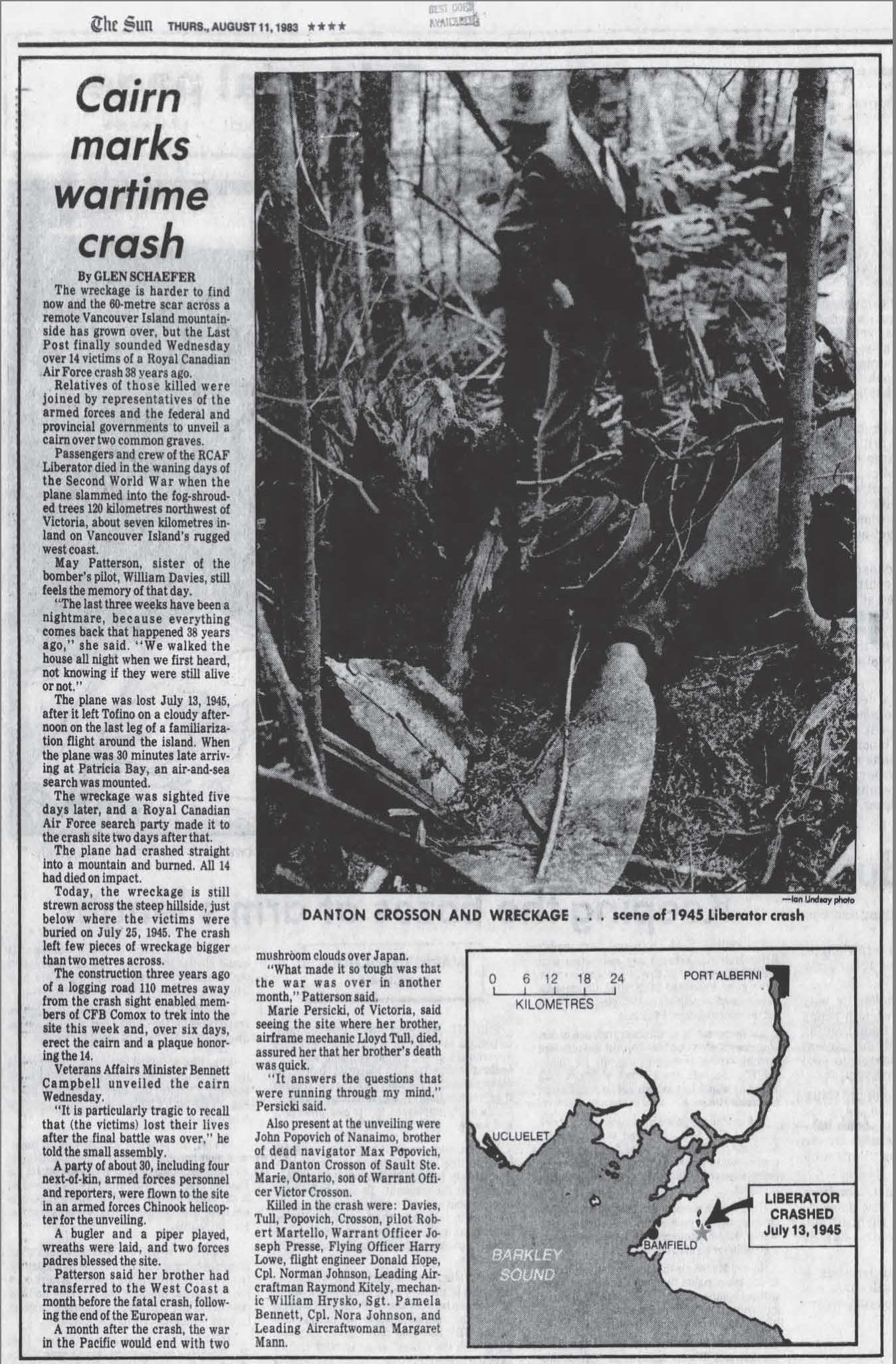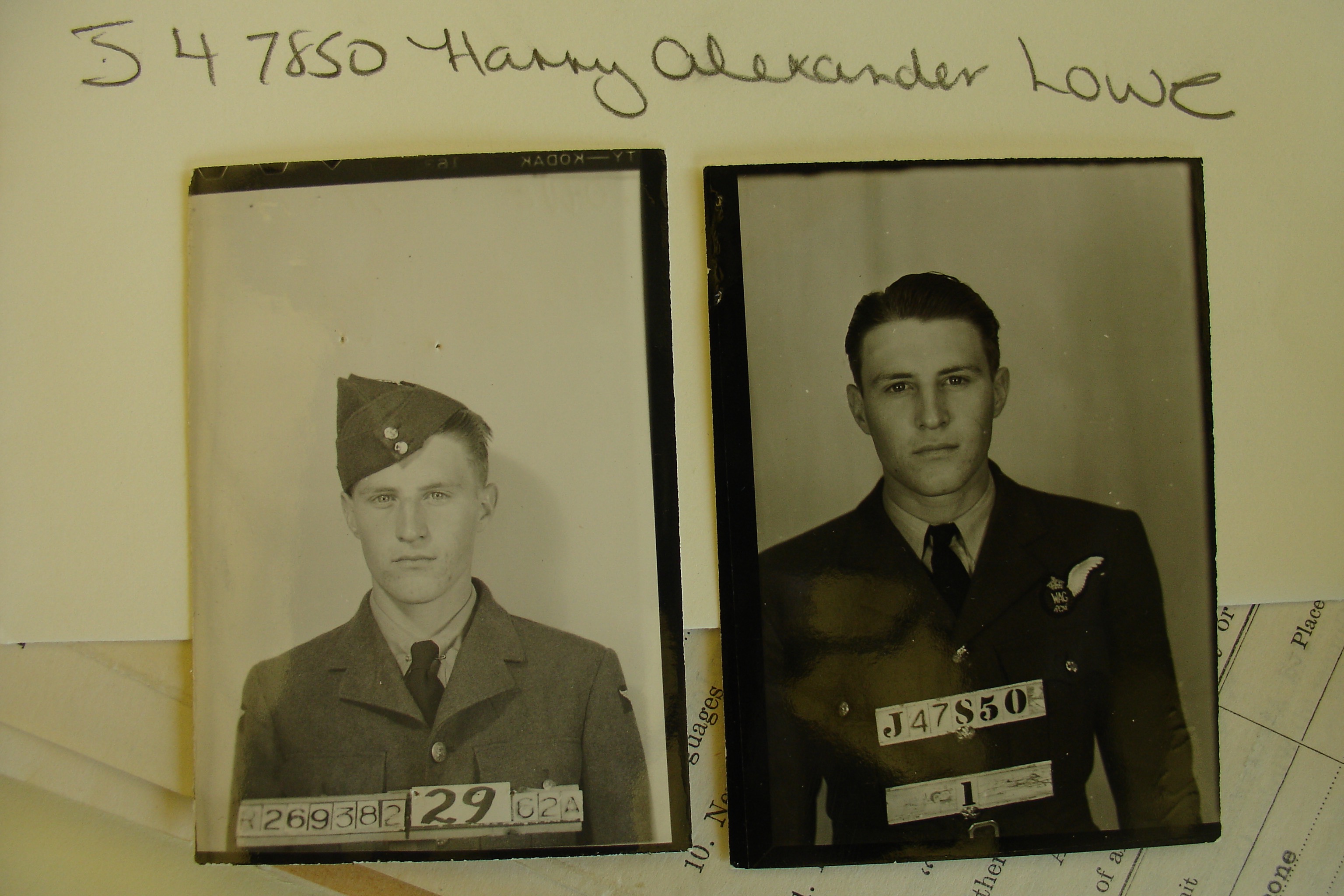

March 15, 1925 - July 13, 1945


Please see links at the bottom of the page to read each person’s own story.
On July 13, 1945, Liberator 11121 which originally took off from Patricia Bay, BC on Vancouver Island at 0830 hours on a familiarization flight. The flight: Patricia Bay to Comox, via Abbotsford and Boundary Bay, then to Comox back to Patricia Bay via Port Hardy and Tofino. "The crew was detailed above and there were no passengers. The orders covering the flight called for contact flight rules with the proviso that should conditions not merit completion under those rules, the pilot would climb to top the cloud layer (or to 9000') on a known radio range and return to base. The flight plan covering the journey to Comox was filled at Pat Bay before departure. The aircraft landed at Comox where the pilot filed a flight plan to cover the next leg of the trip to Tofino via Port Hardy, landing at the former station. Three passengers were added to the flight plan. The Flying Control Officer there stated that he had heard of a fourth passenger boarding the aircraft as it was about to start taxiing, giving the name of LAC Tull. This airman's name was not included in the list of passengers. On landing at Tofino, it was arranged that three additional passengers would be taken on. The weather report here showed an extensive fog bank to the south and southwest which would undoubtedly interfere with continuation of the flight as scheduled. While ceiling conditions were such as would prohibit flying directly across the island under contact flight rules, such flying may have been possible going by way of Port Alberni. The aircraft took off at 1643 hours...at 1656 hours, 13 minutes after take off, the crew broadcast its position which placed the aircraft within the immediate vicinity of Tofino. That was the last heard of the aircraft." At 1653, one wireless transmission had been made, stating the position of the aircraft at that time with estimated time of arrival to be 1740 hours. When Liberator 11121 did not arrive and contact could not be made, a search was instituted.
Liberator 11121 was found near the top of a mountain on which it had crashed. From a report: "It had apparently contacted the trees while flying level. The wreckage spread upwards about three hundred yards in all. The port outer propeller blades were in the feathered position, tips being bent back. The port inner and starboard outer blades were bent forward at the tips as under power at time of impact. The blades of the starboard inner engine were completely sheered off at the propeller hub." The investigation showed that this course did not coincide with that which, if followed, would have led to Patricia Bay.
Aboard were the following individuals:
A Court of Inquiry was struck. Sixteen witnesses were called. Maps and photographs, taken on July 25, 1945 were produced.
The first witness, F/L D. H. Bradley Flight Commander of "A" Flight, 11 BR Squadron, Patricia Bay, BC stated: "F/O Davies was a qualified first pilot both day and night on Liberator aircraft. He received his training on Liberators at USAAF Field, Smyrna, Tennessee. He has been on the squadron about a year and his flying ability, flying knowledge and general squadron work has been average. His exercise on 13.7.45 was an ordinary cross-country flight used to familiarize pilots with aerodromes in our immediate area as well as giving the navigators a chance to familiarize themselves with the coast of the island. Both the second pilot and full crew were fully qualified. F/O Davies had a white instrument rating card issued by the USAAF, which should show that he is fully confident for instrument flight."
The third witness, F/L E. Geddes stated: "I flew the aircraft Liberator 11121 on 12.7.45 the previous flight to that made by F/O Davies. It seemed OK in every respect over the flight of approximately two and a half hours."
The tenth witness, F/L T. H. Kelsey, Armament Officer at No. 11 BR Squadron stated: "The aircraft 11121 was not carrying any bombs. It was carrying pyrotechnics to scale, as laid down for aircraft. It had approximately thirteen hundre rounds of ammunition in the front turret and approximately five hundred rounds in the port waist gun."
The eleventh witness, F/O W. G. Skerik, Air Search and Rescue Officer, Tofino, was part of the first rescue party to reach the wreckage of Liberator 11121. "I identified the body of Cpl N. M. Johnson by a wallet on his clothing. Cpl Hrysko by his wallet, F/O Martello by his wallet, F/O Popovitch by his identity bracelet, F/O Davies by a belt buckle, initial D, and by a ring initialled WED and an RCAF watch...F/S Hope by his identity discs. Seven bodies were found which could not be identified, one of which definitely was a woman and one probably a woman. The other five were definitely identified as men." There were three women on board. "I searched the slope for about 300 yards below the point of impact for evidence of anyone jumping, etc, but nothing was found." Thirteen of the fourteen bodies were found at the scene of the crash. Positive identities were not able to be made of many of the people onboard, including LAW Margaret Mann. She was considered to be 'Missing, believed killed,' as were Crosson, Presse, Lowe, Kiteley, Bennett, N. Johnson, and Tull.
The twelfth witness, Sgt G. Rouse, stated, "Cpl Johnson and LAC Kiteley came to the tower and asked if they could get a ride on Liberator 11121 which was about to depart for Patricia Bay. I asked the pilot of Liberator 11121 if he could take a couple of passengers. He replied that unless it was important, he could not take them. As LAC Kiteley wanted to ride for compassionate reasons, they were both taken along. I entered their names in the Controller's Log and informed operations, who said that Cpl Hrysko was also going as a passenger...the pilot informed me that he intended to be at 10,000 feet at Ucluelet."
The fifteen witness, Wing Commander W. R. Swetman, stated, "In my opinion, F/O Davies was just an average pilot, having just received his captaincy a short time ago after having passed all his prescribed tests satisfactorily. This was F/O Davies first trip over the above route as Captain of the aircraft."
The sixteenth witness, F/L Stewart stated, "About 1300 hours, F/O Davies reported to the Operations Room and filed his flight plan which was Comox - Port Hardy - Tofino, landing at Tofino, then to Patricia Bay. As F/O Davies explained, that this was a coast crawl around the coast, I was somewhat leary about authorizing this flight as the weather conditions on route to Port Hardy were about minimum CFR limits. F/O Davies said he had flown around the coast before as 2nd pilot and if he could not maintain CFR limits, he would either cut across the island or turn back. I then sent F/O Davies up to see the meteorological Officer to get a thorough briefing on the weather. I authorized this flight and the following three passengers, Sgt Bennett, Cpl Johnson and LAW Mann. I did not authorize LAC Tull."
A restricted CBC radio news report was issued about the crash. The story made many newspapers across the country.
In a letter dated July 25, 1945, copied to all family members of those onboard Liberator 11121, it stated, "...the location of the wreckage was such that it was impossible to bring out the remains of the victims for burial and it was, therefore, decided to effect burial in a common grave at the scene of the crash. However, a memorial service was conducted by this Squadron to coincide as closely as possible with the funeral service. All Officers and Airmen of the Squadron who were available, were formed into a hollow square in front of a Squadron Liberator and the service was conducted by the Station Chaplain. A photograph of the ceremony is enclosed."
A memo from the Chief of Staff Office, dated September 11, 1945: "The Tofino weather report indicated that the route via Alberni or Comox to Patricia Bay was CFR. Pilot definitely broke CFR rules when entering clouds. Altitude could have been reached by taking advantage of the broken overcast. Aircraft should not have been allowed 'off' Tofino on coast crawl route on account of southern fog. I do not agree with the contributory causes Para. 1 as the pilot was 40 minutes in Tofino and Comox weather should have been checked. Consider pilot error is the main factor. It would appear probable, in view of the aircraft at the time it crashed and the altitude of the crash, that the pilot had attempted to follow the coast and being unable to do so by reason of weather, turned inland while climbing in an effort to find the western leg of Patricia Bay range. This theory, however, does not account for the aircraft having remained in the vicinity of Tofino for 13 minutes after taking off from there, but if correct, then it was obvious that he was in cloud or fog at least part of the time and while flying thus, the aircraft collided with a mountain...Pilot error in that the pilot failed to maintain a wide margin of safety over the existing terrain while flying in overcast conditions."
In a memo by G/C F. S. Wilkins, Chief Investigator, Accidents October 4, 1945: "It seems that there were six passengers in addition to the crew of seven. If a fourth passenger boarded the aircraft at Comox, than the total number of occupants was fourteen, but only thirteen bodies were located. LAC Tull was not among those identified. Since there is no documented record of this passenger and there is no direct evidence that he did board the aircraft, the reporting of LAC Tull as a casualty in this accident is open to question."
From the Canadian Virtual War Memorial: "A commemorative cairn was constructed and erected by the personnel of Canadian Forces Base Comox at the site of the July 13, 1945 crash of a Royal Canadian Air Force Liberator near Bamfield, British Colombia. It bears a bronze plaque provided by the Canadian Agency of the Commonwealth War Graves Commission. The cairn stands at the site of the last resting place of the fourteen crash victims. It was unveiled on August 10, 1983 by the Honourable W. Bennett Campbell, Minister of Veterans Affairs, in the presence of representatives of the families of the crash victims."
LINKS: